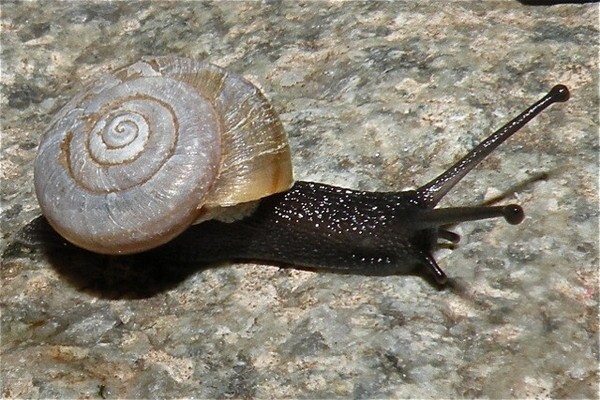Emergency Protection Urged For Desert Snail

A tiny Mojave Desert snail that lives under rocks on mountain slopes is threatened by a new Kern County gold mine, according to a group urging emergency protection for the snail under the federal Endangered Species Act (ESA).
The Mohave shoulderband, Helminthoglypta greggi, is a pale-brown half-inch snail with a flattened shell found on just three small isolated mountains in the western Mojave Desert near the town of Mojave. The mountains cover less than eight square miles of desert: the snails use only a small proportion of that area.
Soledad Mountain is home to the vast majority of the Mohave shoulderband's habitat: 86 percent. The owners of the Golden Queen Mine got funding in January to turn half that habitat into an open-pit gold and silver mine. And that's why the Center for Biological Diversity filed an emergency petition Friday to ask the U.S. Fish and Wildlife Service to designate the snail as Threatened or Endangered.
"This little desert snail is a unique part of California's special natural heritage, but there are zero protections in place right now to save it from extinction," said CBD biologist Tierra Curry. "We're asking for emergency Endangered Species Act protection so mitigation measures can be developed to safeguard at least part of the snail's population from open-pit mining operations."
Under the Endangered Species Act, USFWS must now decide within 90 days whether to start a year-long listing decision process for the snail. USFWS isn't legally obliged to consider the emergency aspect of the petition, but if it does decide to list the snail on an emergency basis, it can grant temporary ESA protection to the snail almost immediately.
The agency maintains that it considers the possibility of emergency listing for every species for which it receives a listing petition.
Dry desert mountain slopes are about the last place you'd expect to find animals like snails. Even terrestrial snails are supremely vulnerable to dehydration. Like several other desert snails, Mohave shoulderbands just barely hang on by finding the moistest places available on those desert mountains: the spaces between rocks in the mountains' north-facing talus slopes. They've also been found inside woodrat middens, where the organic materials collected by the rodents serve to humidify things ever so slightly.
Because they're so closely restricted to what are essentially islands of habitat, Mohave shoulderbands can't just pick up and find somewhere else to live when their habitat is destroyed. The open desert that surrounds the isolated peaks the snail calls home are too arid for them to cross. (The present population likely descended from more widespread populations across a wetter Mojave Desert 15,000 years ago.)
The new Golden Queen pit would destroy something like 40 percent of the species' total habitat. But because the snail enjoys no legal protection at either the federal or state levels, the mine owners have not been required to reduce or mitigate their damage to that habitat.
"Petitioners request emergency listing of the Mohave Shoulderband," reads the CBD's petition to USFWS, "because the Golden Queen Mine on Soledad Mountain has begun construction and no mitigation measures are in place to safeguard the snail."
More than 100 species of Helminthoglypta are native to California, two of which -- the Morro and Chorro shoulderbands, thought until 2004 to be the same species -- are federally Endangered. Inhabitants of coastal sand dune ecosystems, the coastal shoulderbands are threatened by development and off-road vehicle use.
Worldwide, molluscs like the Mohave shoulderband are in trouble. They account for 40 percent of known extinctions in the modern era. with freshwater molluscs in the Southeastern U.S. especially hard-hit.
If CBD's petition is successful, the Mohave shoulderband would become the fifth California mollusc to be listed under the Endangered Species Act. Along with the two Morro Bay area shoulderbands, the Mohave shoulderband would be joining the black and white abalone in sharing the dubious honor of ESA listing. Both species of abalone are listed as Endangered.


